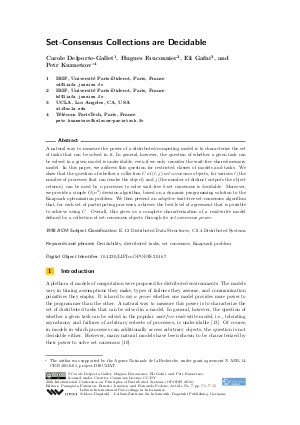Set-Consensus Collections are Decidable
Authors Carole Delporte-Gallet, Hugues Fauconnier, Eli Gafni, Petr Kuznetsov
-
Part of:
Volume:
20th International Conference on Principles of Distributed Systems (OPODIS 2016)
Part of: Series: Leibniz International Proceedings in Informatics (LIPIcs)
Part of: Conference: International Conference on Principles of Distributed Systems (OPODIS) - License:
 Creative Commons Attribution 3.0 Unported license
Creative Commons Attribution 3.0 Unported license
- Publication Date: 2017-04-06
File

PDF
LIPIcs.OPODIS.2016.7.pdf
- Filesize: 0.51 MB
- 15 pages
Document Identifiers
Subject Classification
Keywords
- Decidability
- distributed tasks
- set consensus
- Knapsack problem
Metrics
- Access Statistics
-
Total Accesses (updated on a weekly basis)
0PDF Downloads0Metadata Views
Abstract
A natural way to measure the power of a distributed-computing model is to characterize the set of tasks that can be solved in it. In general, however, the question of whether a given task can be solved in a given model is undecidable, even if we only consider the wait-free shared-memory model. In this paper, we address this question for restricted classes of models and tasks. We show that the question of whether a collection C of (l, j)-set consensus objects, for various l (the number of processes that can invoke the object) and j (the number of distinct outputs the object returns), can be used by n processes to solve wait-free k-set consensus is decidable. Moreover, we provide a simple O(n^2) decision algorithm, based on a dynamic programming solution to the Knapsack optimization problem. We then present an adaptive wait-free set-consensus algorithm that, for each set of participating processes, achieves the best level of agreement that is possible to achieve using C. Overall, this gives us a complete characterization of a read-write model defined by a collection of set-consensus objects through its set-consensus power.
Cite As Get BibTex
Carole Delporte-Gallet, Hugues Fauconnier, Eli Gafni, and Petr Kuznetsov. Set-Consensus Collections are Decidable. In 20th International Conference on Principles of Distributed Systems (OPODIS 2016). Leibniz International Proceedings in Informatics (LIPIcs), Volume 70, pp. 7:1-7:15, Schloss Dagstuhl – Leibniz-Zentrum für Informatik (2017)
https://doi.org/10.4230/LIPIcs.OPODIS.2016.7
BibTex
@InProceedings{delportegallet_et_al:LIPIcs.OPODIS.2016.7,
author = {Delporte-Gallet, Carole and Fauconnier, Hugues and Gafni, Eli and Kuznetsov, Petr},
title = {{Set-Consensus Collections are Decidable}},
booktitle = {20th International Conference on Principles of Distributed Systems (OPODIS 2016)},
pages = {7:1--7:15},
series = {Leibniz International Proceedings in Informatics (LIPIcs)},
ISBN = {978-3-95977-031-6},
ISSN = {1868-8969},
year = {2017},
volume = {70},
editor = {Fatourou, Panagiota and Jim\'{e}nez, Ernesto and Pedone, Fernando},
publisher = {Schloss Dagstuhl -- Leibniz-Zentrum f{\"u}r Informatik},
address = {Dagstuhl, Germany},
URL = {https://drops.dagstuhl.de/entities/document/10.4230/LIPIcs.OPODIS.2016.7},
URN = {urn:nbn:de:0030-drops-70761},
doi = {10.4230/LIPIcs.OPODIS.2016.7},
annote = {Keywords: Decidability, distributed tasks, set consensus, Knapsack problem}
}
Author Details
References
-
Yehuda Afek, Hagit Attiya, Danny Dolev, Eli Gafni, Michael Merritt, and Nir Shavit. Atomic snapshots of shared memory. Journal of the ACM, 40(4):873-890, 1993.

-
Yehuda Afek, Faith Ellen, and Eli Gafni. Deterministic objects: Life beyond consensus. In PODC, 2016.

-
Elizabeth Borowsky and Eli Gafni. Generalized FLP impossibility result for t-resilient asynchronous computations. In STOC, pages 91-100. ACM Press, May 1993.

- Elizabeth Borowsky and Eli Gafni. The implication of the Borowsky-Gafni simulation on the set-consensus hierarchy. Technical report, UCLA, 1993. URL: http://fmdb.cs.ucla.edu/Treports/930021.pdf.
-
Elizabeth Borowsky, Eli Gafni, Nancy A. Lynch, and Sergio Rajsbaum. The BG distributed simulation algorithm. Distributed Computing, 14(3):127-146, 2001.

-
Tushar Deepak Chandra, Vassos Hadzilacos, and Sam Toueg. The weakest failure detector for solving consensus. Journal of the ACM, 43(4):685-722, July 1996.

-
Tushar Deepak Chandra and Sam Toueg. Unreliable failure detectors for reliable distributed systems. Journal of the ACM, 43(2):225-267, March 1996.

-
Soma Chaudhuri and Paul Reiners. Understanding the set consensus partial order using the Borowsky-Gafni simulation (extended abstract). In WDAG, pages 362-379, 1996.

-
Carole Delporte-Gallet, Hugues Fauconnier, Eli Gafni, and Petr Kuznetsov. Wait-freedom with advice. Distributed Computing, 28(1):3-19, 2015.

-
Carole Delporte-Gallet, Hugues Fauconnier, Rachid Guerraoui, and Andreas Tielmann. The disagreement power of an adversary. Distributed Computing, 24(3-4):137-147, 2011.

-
Michael J. Fischer, Nancy A. Lynch, and Michael S. Paterson. Impossibility of distributed consensus with one faulty process. Journal of the ACM, 32(2):374-382, April 1985.

-
Eli Gafni and Rachid Guerraoui. Generalized universality. In Proceedings of the 22nd international conference on Concurrency theory, CONCUR'11, pages 17-27, Berlin, Heidelberg, 2011. Springer-Verlag.

-
Eli Gafni and Elias Koutsoupias. Three-processor tasks are undecidable. SIAM J. Comput., 28(3):970-983, 1999.

-
Eli Gafni and Petr Kuznetsov. Turning adversaries into friends: Simplified, made constructive, and extended. In OPODIS, pages 380-394, 2010.

-
Eli Gafni and Petr Kuznetsov. Relating L-Resilience and Wait-Freedom via Hitting Sets. In ICDCN, pages 191-202, 2011.

-
Eli Gafni, Michael Merritt, and Gadi Taubenfeld. The concurrency hierarchy, and algorithms for unbounded concurrency. In PODC, pages 161-169, 2001.

-
Eli Gafni, Sergio Rajsbaum, and Maurice Herlihy. Subconsensus tasks: Renaming is weaker than set agreement. In DISC, pages 329-338, 2006.

-
Maurice Herlihy. Wait-free synchronization. ACM Transactions on Programming Languages and Systems, 13(1):123-149, January 1991.

-
Maurice Herlihy and Sergio Rajsbaum. The decidability of distributed decision tasks (extended abstract). In STOC, pages 589-598, 1997.

-
Maurice Herlihy and Nir Shavit. The topological structure of asynchronous computability. Journal of the ACM, 46(2):858-923, 1999.

-
Hans Kellerer, Ulrich Pferschy, and David Pisinger. Knapsack problems. Springer, 2004.

-
Wai-Kau Lo and Vassos Hadzilacos. All of us are smarter than any of us: Nondeterministic wait-free hierarchies are not robust. SIAM J. Comput., 30(3):689-728, 2000.

-
Paul Reiners. Understanding the set consensus partial order using the Borowsky-Gafni simulation. Master’s thesis, Iowa State University, 1996.

-
Michael Saks and Fotios Zaharoglou. Wait-free k-set agreement is impossible: The topology of public knowledge. SIAM J. on Computing, 29:1449-1483, 2000.

